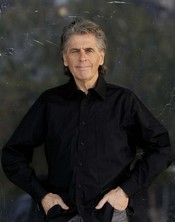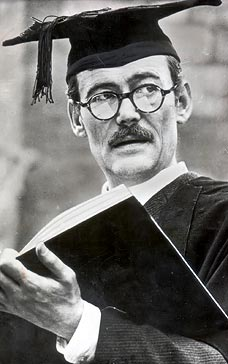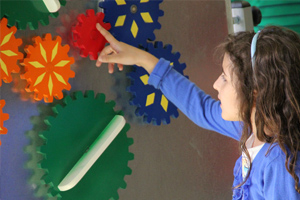“The trouble is, the education system is at least 50 years behind the changes in technology in society.”

Let me begin by stating quite categorically that I am far from being a wizard at math. My education in that field petered out in high school. And about the only area where I still use math in my life is in balancing my checkbook. Yes, I know, I'm old school.
But I have a huge amount of respect for people who have gone deep into subjects where I fear to tread. I respect quality education and I deeply respect brilliant minds. Like the old farmer once said, “ I may not know what you are saying but I can tell you are an educated man and I respect that.”
 So, when I found my car radio accidentally tuned into an interview with a brilliant man I listened. And I listened carefully. I don't understand all of what he said, but I believe he is right in most all of what he said.
So, when I found my car radio accidentally tuned into an interview with a brilliant man I listened. And I listened carefully. I don't understand all of what he said, but I believe he is right in most all of what he said.
The man in question is Mr. Keith Devlin, executive director of H-Star, the Human-Sciences and Technologies Advanced Research Institute at Stanford University. He was interviewed by Krista Tippett of onbeing.org and the interview was broadcast on NPR.
Mr. Devlin is heavily involved in the development of MOOCs (Massive Open Online Courses) and the evolution of education. As a mathematician his world view is unique and quite different from that of you or me.
“If you go back to the point I made earlier, that mathematics is just really looking at the way the human mind encounters its environment, then if that's what we're doing, you should expect that things we develop — even though we can't understand how it's going to be relevant now — will eventually be relevant. Because what it really tells us is, at the time we've done that mathematics, we haven't developed as a society or individuals to the point where we can appreciate what we've just seen.”
He is fascinated by the evolution of math in terms of it's application in human advancement, but also in how it is a reflection of the human mind.
“...mathematics isn't the discovery of an external platonic realm, that it's actually the building and study of a realm within our own minds.”
 He makes great points about the evolution of education...
He makes great points about the evolution of education...
“If the last experience you have of mathematics is what you learned certainly up to the middle level of high school, and to a large extent even right through the end of high school the way it's taught, you've basically never seen mathematics. And so most people in the world haven't a clue what mathematics is.”
...and how it has yet to catch up to the technology we now possess and continue to improve upon.
“....one of the leading people, G.H. Hardy in Cambridge, actually went on record in a book and said — he was quite — because someone had challenged him about the fact that you can use these things for practical uses in mathematics. And he said — he went on record as saying, nothing he had done in his professional career could ever find practical application. And by golly, within a hundred years, this is the basis for the Internet in modern society and security.”
And also about what we are discovering about how the human brain works and learns.
 “But a lot of the problem in mathematics is that an awful lot of what goes on in the school system is basically trying to train the mind to do what a $10 calculator can do: follow rules and algorithms and procedures. And one thing that we do know is, that the human brain does not find that natural. The human brain is analogical, not logical. And so, when we try to force it to be procedural and exact, the brain simply doesn't like it.”
“But a lot of the problem in mathematics is that an awful lot of what goes on in the school system is basically trying to train the mind to do what a $10 calculator can do: follow rules and algorithms and procedures. And one thing that we do know is, that the human brain does not find that natural. The human brain is analogical, not logical. And so, when we try to force it to be procedural and exact, the brain simply doesn't like it.”
There is much in the interview to enjoy and I heartily recommend it. There is a wonderful section about the relationships between advanced mathematical formulas and music. And another section about the invention of language and how it coincided directly with the creation of math and numbers. Even Mr. Devlin's modified Yorkshire accent is totally charming. But near the end he delves into what appears to be his strongest passion at this moment, and that is the study of learning just how we learn, and, by extension, how we can improve that process.
“Right now, in education, we are in the 18th century. We are actually, I think, within a couple decades — of being able to actually improve mathematics education to the point where people actually do begin to get it and get over the hurdles. Because we're beginning to understand it better...”
So, if you are of a mind, give it a listen, or just read through the transcript (though the accent really is a pleasure to listen to.). Education is, after all, something that affects us all, and upon which our entire future hangs. Let us know what you think. We would like your comments.
“Because the more we learn about how we learn, the more we learn about what it is to be human.”
 Here at Mobile Ed, though we are not world class mathematicians, we do know a little bit about learning, after working with young minds every day for more than thirty years. Which is why, step by step, we are trying to introduce new concepts into the world of school assemblies. Our new STEM Museum is a perfect example, placing exciting interactive hands-on activity stations, from the worlds of Science, Technology, Engineering and Math, directly into the hands of students all over the country and often in locations where no similar opportunity exists.
Here at Mobile Ed, though we are not world class mathematicians, we do know a little bit about learning, after working with young minds every day for more than thirty years. Which is why, step by step, we are trying to introduce new concepts into the world of school assemblies. Our new STEM Museum is a perfect example, placing exciting interactive hands-on activity stations, from the worlds of Science, Technology, Engineering and Math, directly into the hands of students all over the country and often in locations where no similar opportunity exists.
Perhaps next time we will being looking at finding new ways to use the internet, as in the MOOC's currently being created and honed by Mr. Devlin and others, to bring our own unique blend of education and fun directly into your stucdents hand held device. It sure would save us a lot on gasoline!
Geoff Beauchamp is the Regional Manager of Mobile Ed Productions where "Education Through Entertainment" has been the guiding principal since 1979. Mobile Ed Productions produces and markets quality educational school assembly programs in the fieldsof science, history, writing, astronomy, natural science, mathematics, character issues and a variety of other curriculum based areas. In addition, Mr. Beauchamp is a professional actor with 30 years of experience in film, television and on stage. He created and still performs occasionally in Mobile Ed's THE LIVING LINCOLN. He also spent ten years coordinating assembly programs for the elementary school where his own children went to school.







